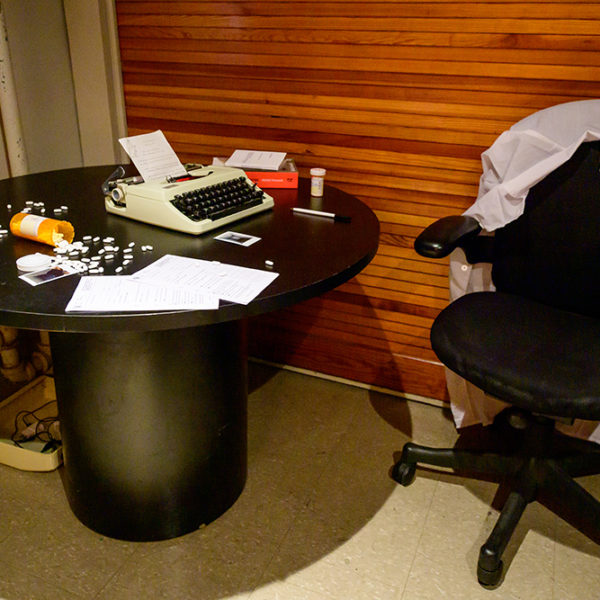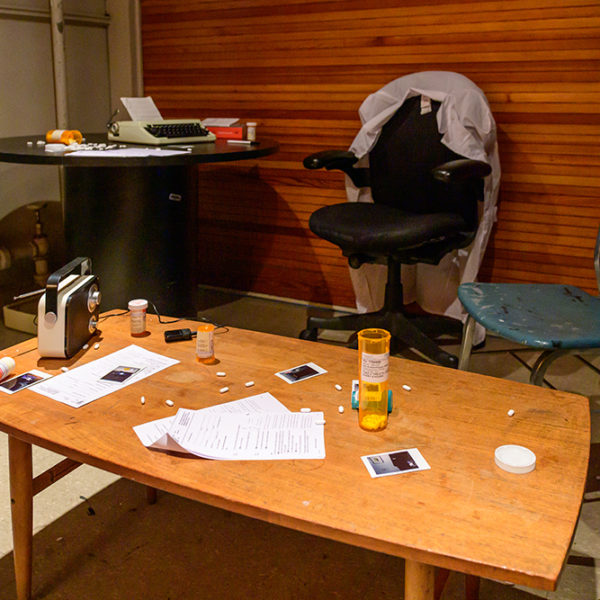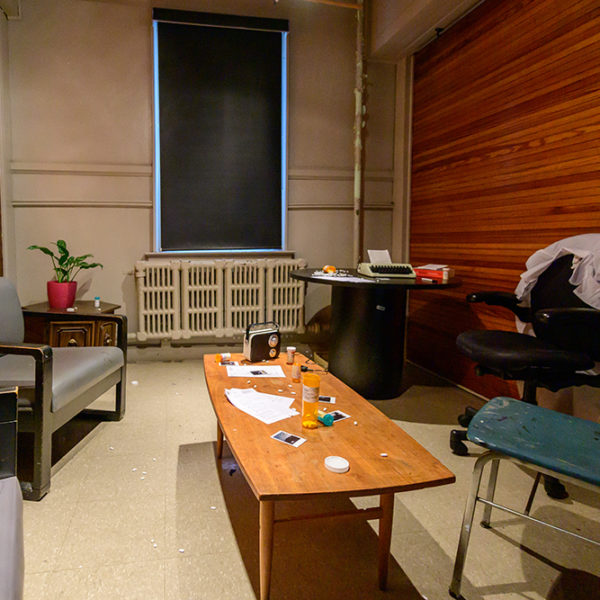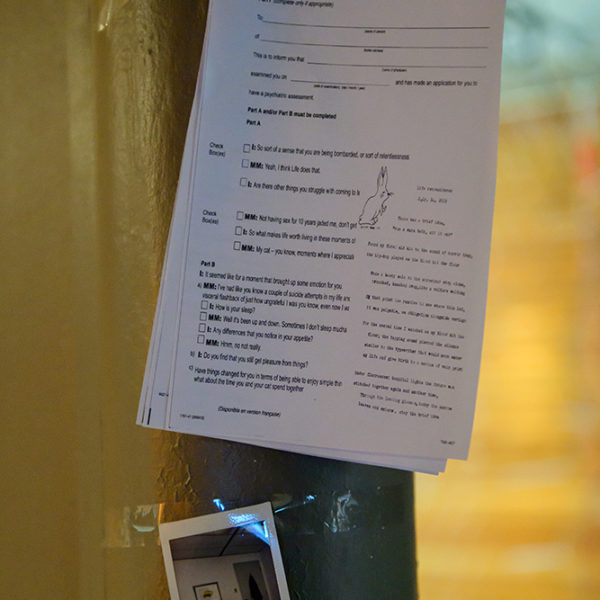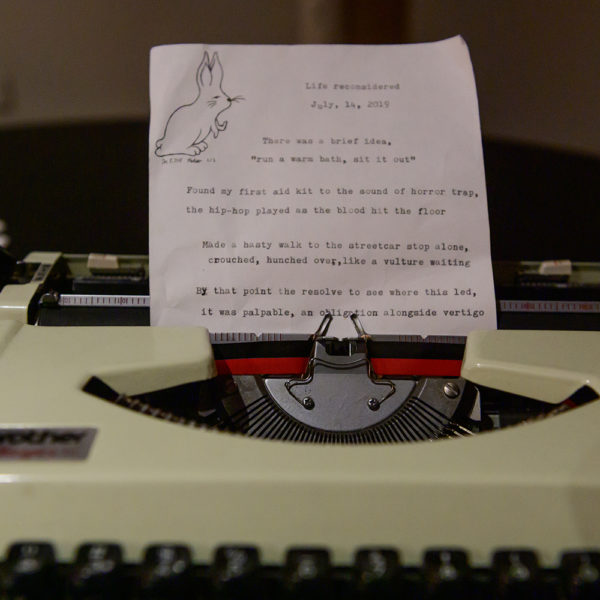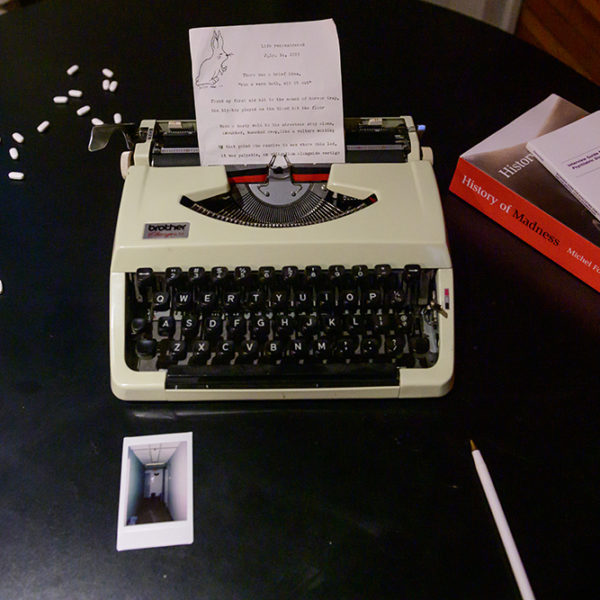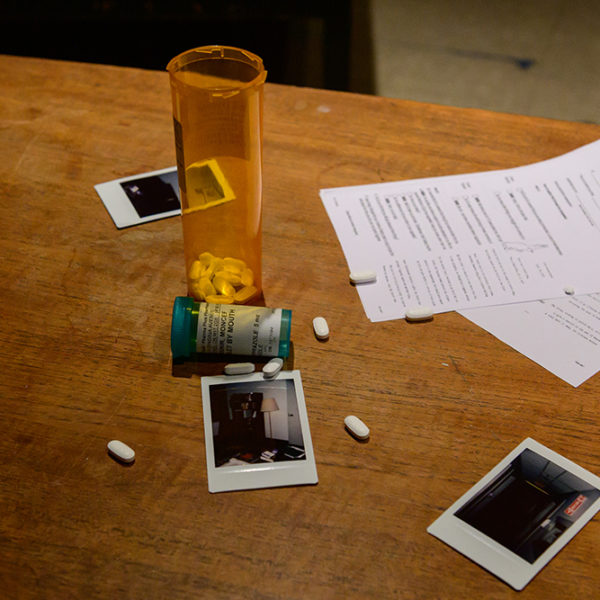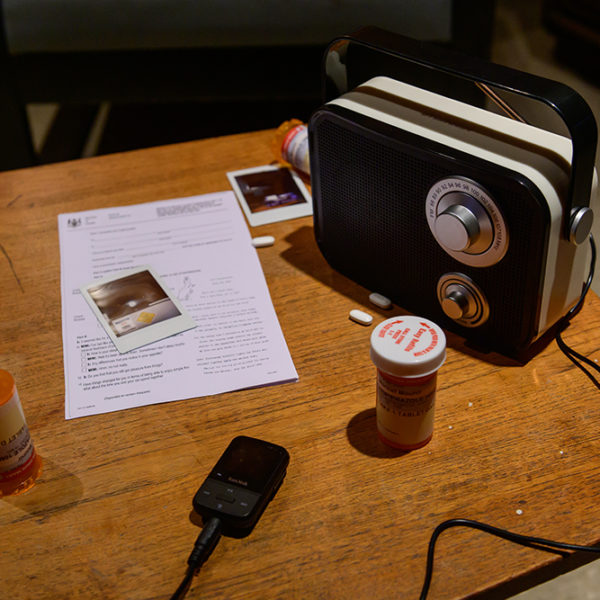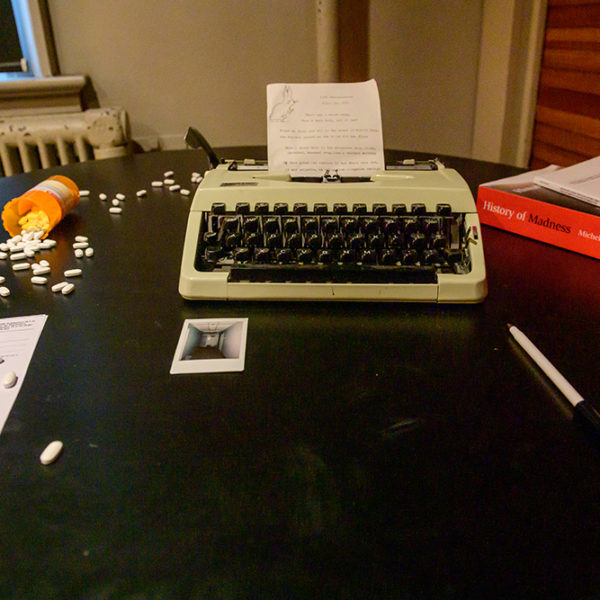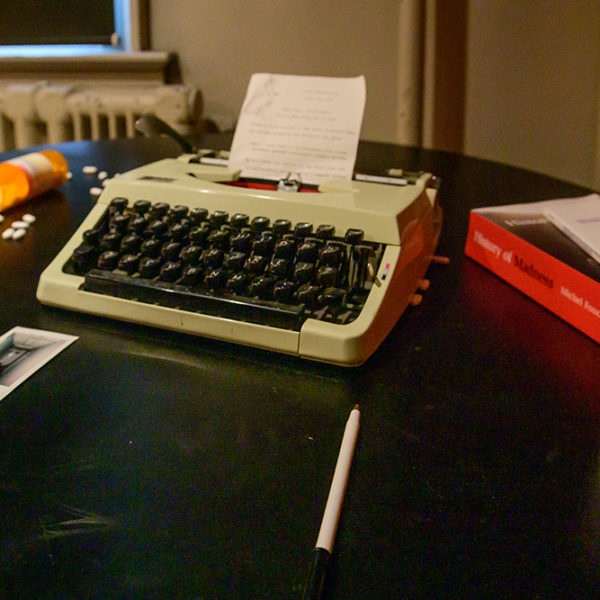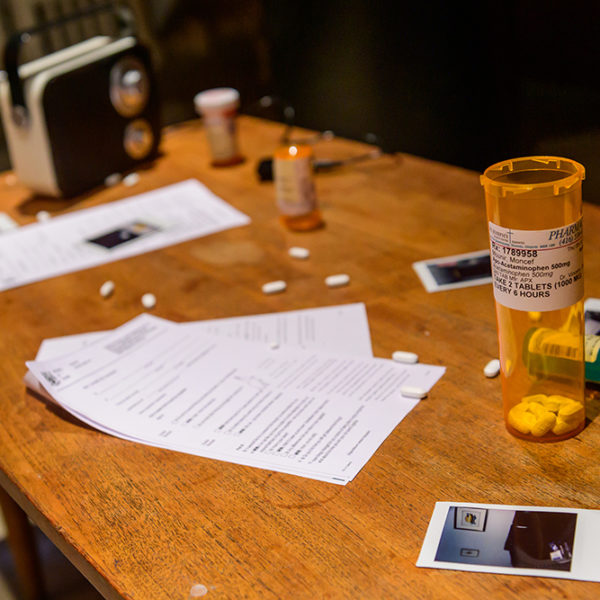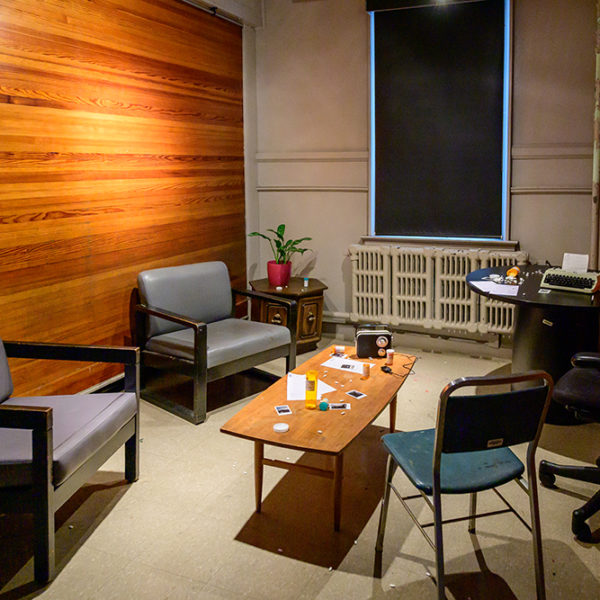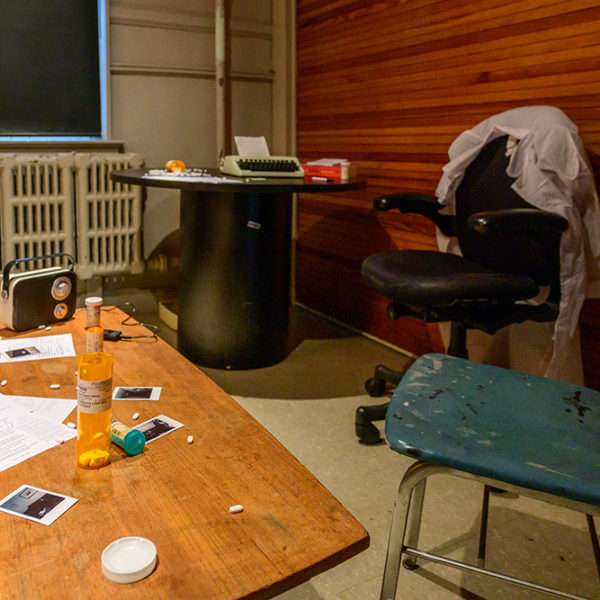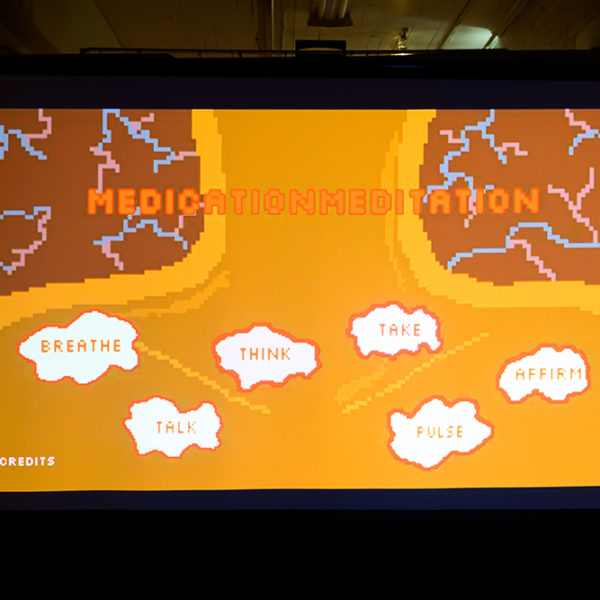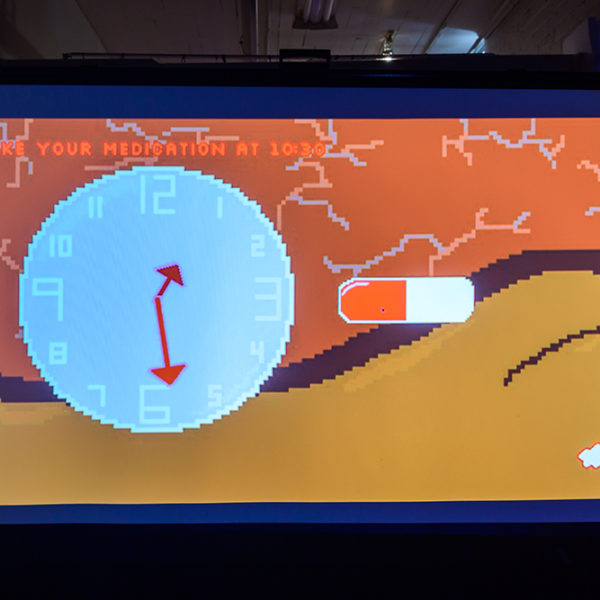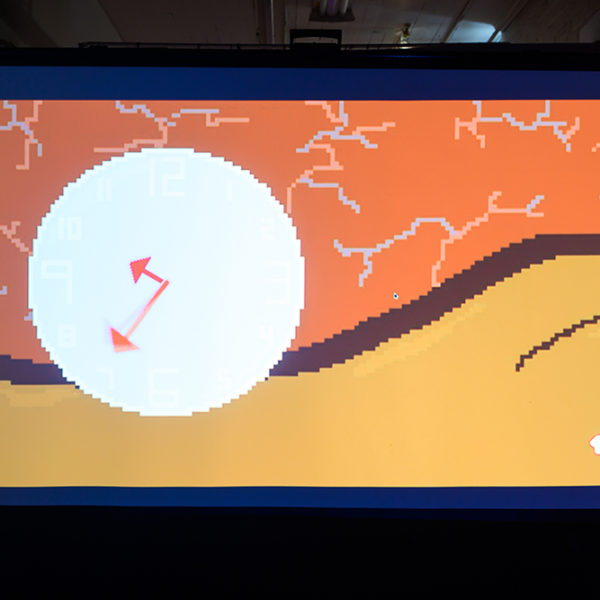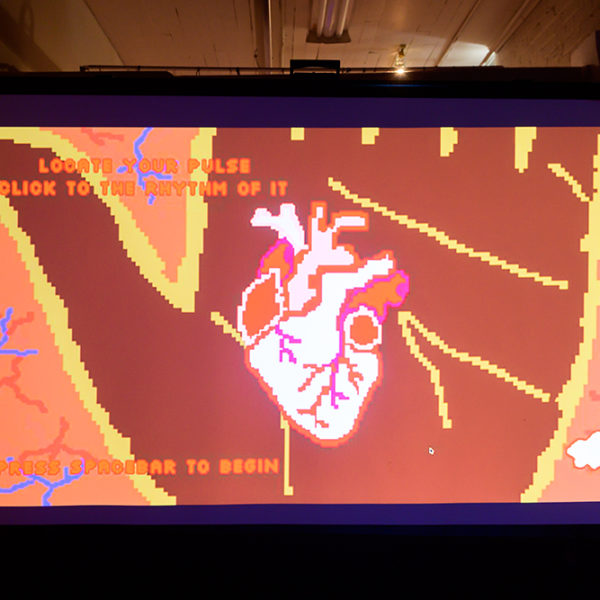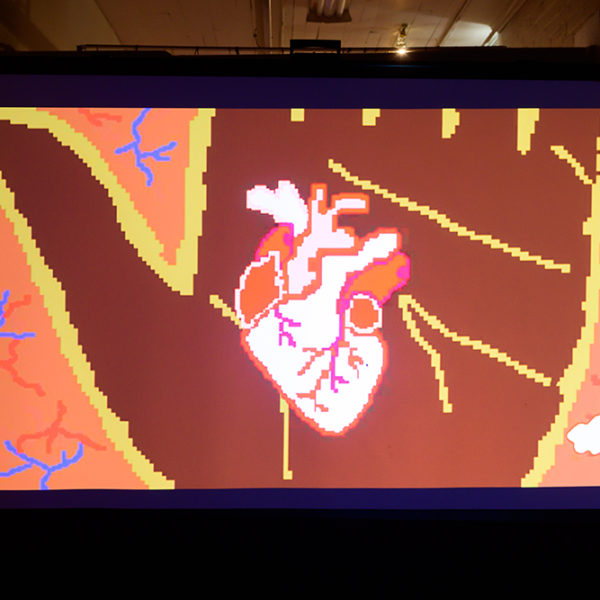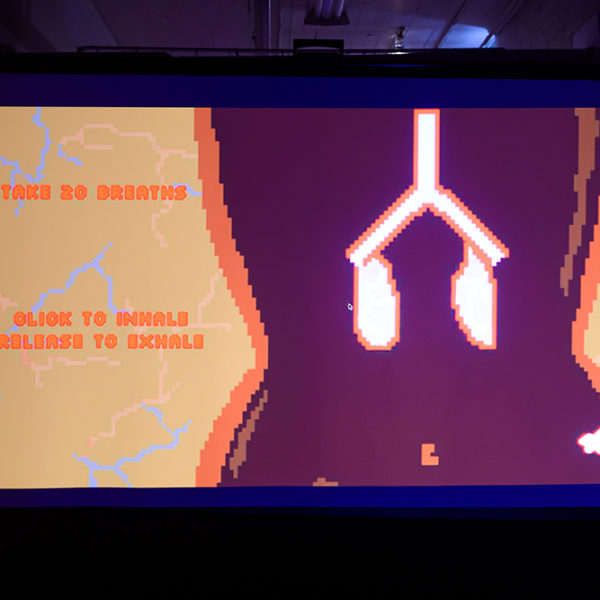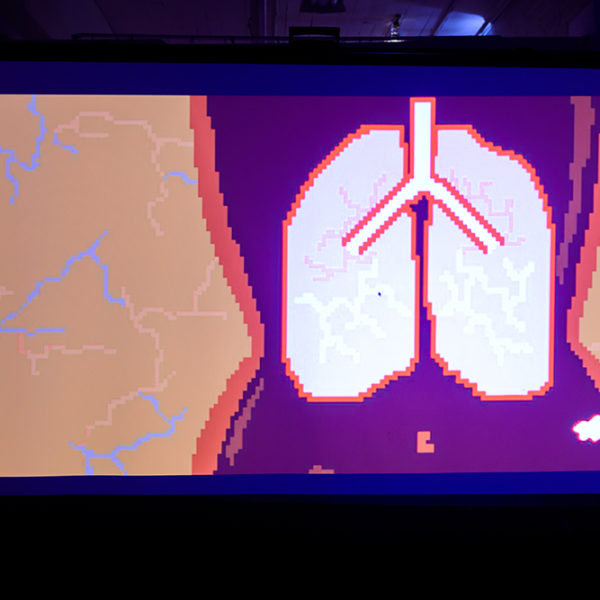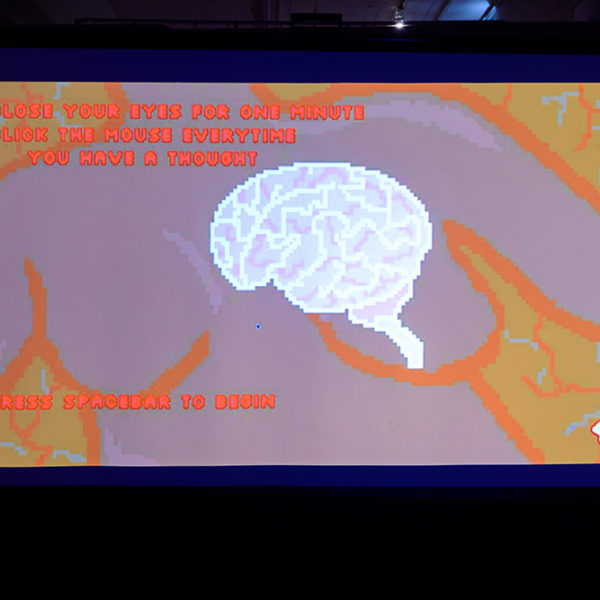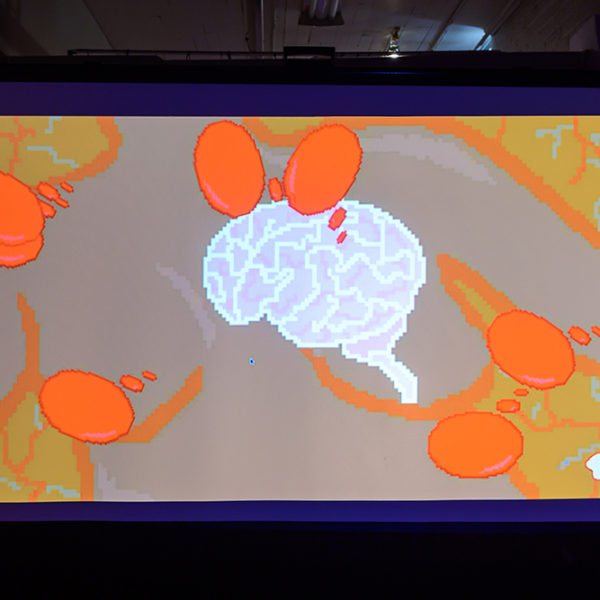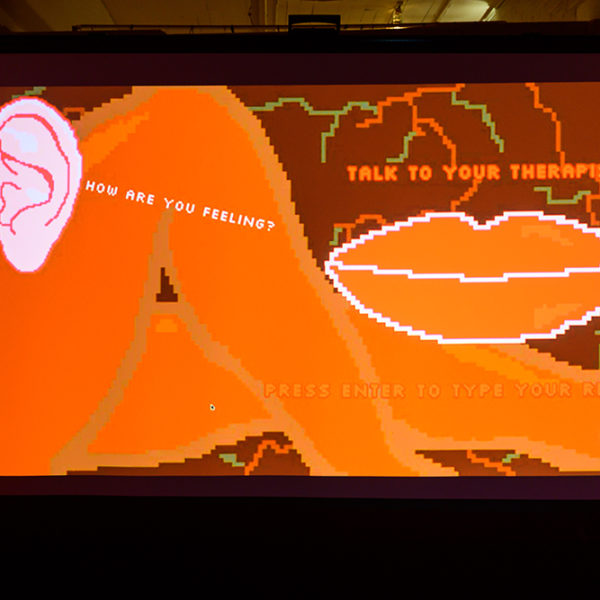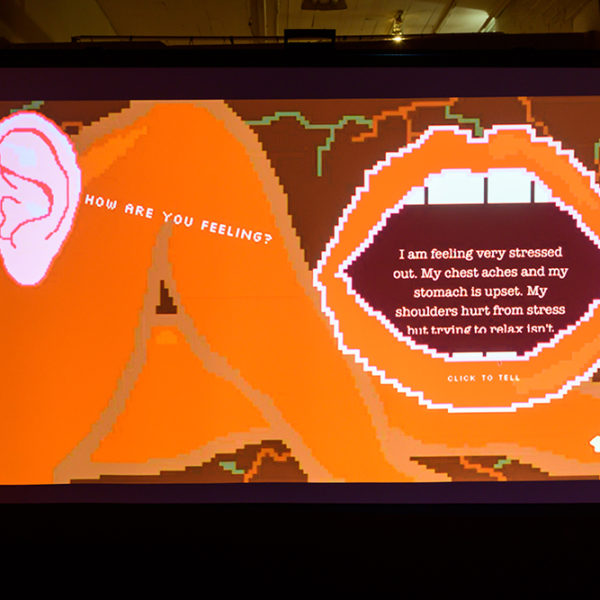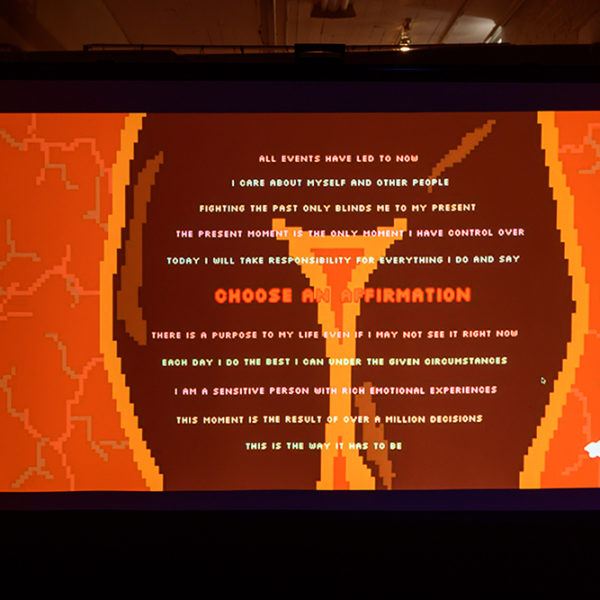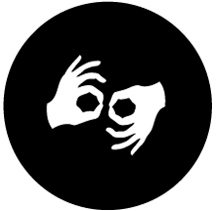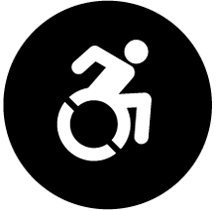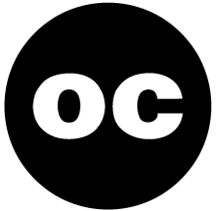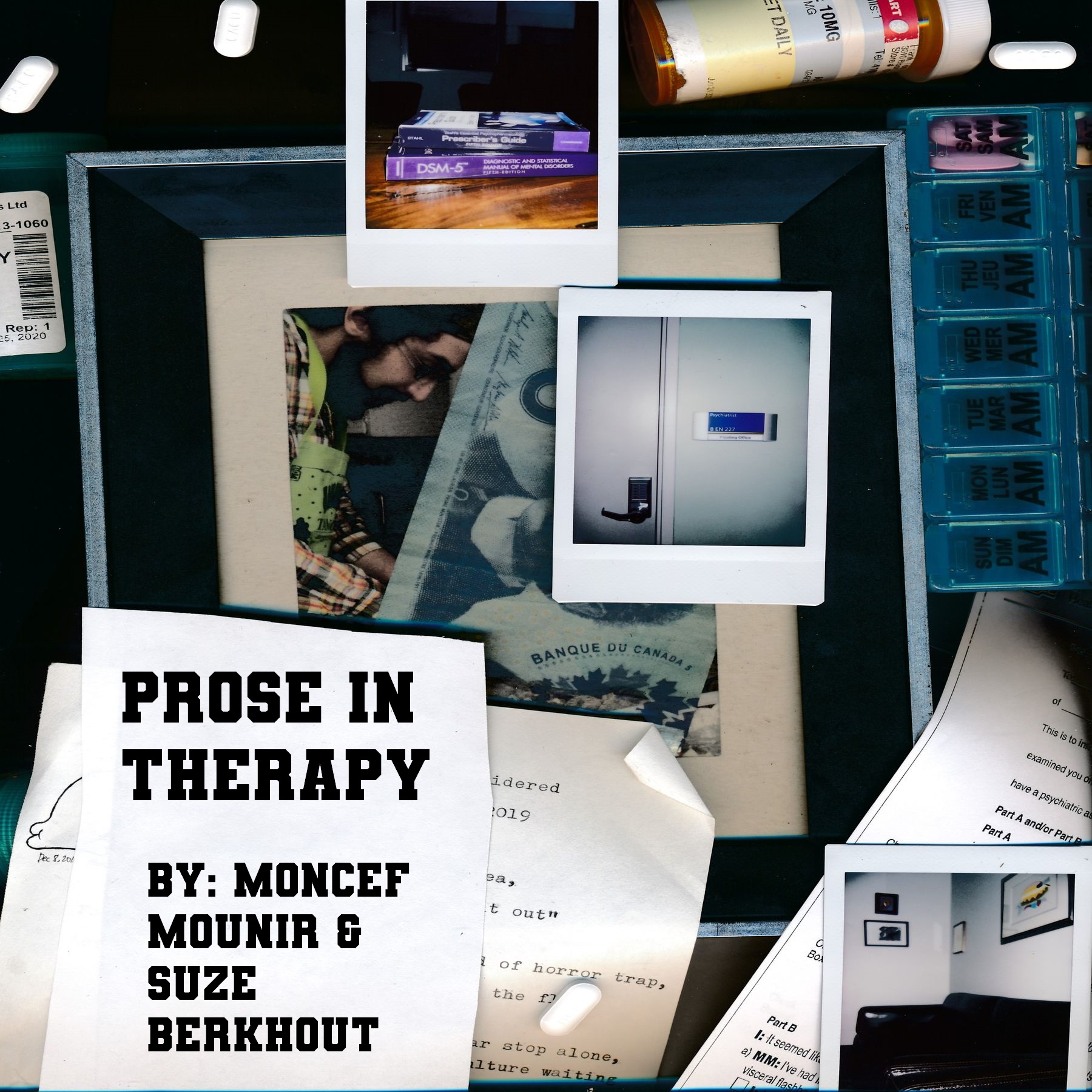
Quarter Kid Productions / Creator and Co-producer: Moncef Mounir / Co-producer: Suze Berkhout / Sketch Artist: Michael Vuong / Logistical Support: Alexander Galeazzi, Rick Grimes, Alex MacIntyre, Paul Nguyen
GENRE: POETRY
TOPIC: DEPRESSION, DISABILITY, PSYCHIATRY, SCHIZOPHRENIA, SUICIDE, TRAUMA
Prose In Therapy is a convergence of free form poetics and imitated therapy. This work is meant to break down the formality of medical procedures through the use of atypical document format aesthetics. The intimate and thought-provoking language used is accompanied by somewhat childish drawings that play on the somatic realities of mortality. Prose In Therapy addresses the delicate situation of being a patient in mental health recovery while verging into themes of honesty, sexuality and economic frustration. The cartoon drawings found on each page of Prose In Therapy were made in collaboration with local sketch artist Michael Vuong. These poems were all read to audiences at Toronto open-mic events including local venues Shab-e She’r and Art Bar.
Moncef Mounir was born in Rabat, Morocco. He is a poet, visual artist and the director of Quaker Kid Productions (QKP), a print media outfit with various collaborative chapbook and zine works. He has spent a decade as a skilled labourer across the City of Toronto and works as a legal assistant after receiving his P1 paralegal’s license. Moncef operates 20scene.com, a blog-style venue to expose his live music editorial zines while also releasing QKP print media works. Moncef has spent over 7 years in mental health recovery and has 4 years abstinence from drugs and alcohol as of September 2020.
CONTENT WARNING
Mature Language, Sexual Content, Suicide
This artist has an item in the RWM swag bag to go with their piece in the exhibition. All ticket holders will be invited to receive RWM swag bags available for free curbside pickup during festival hours.
Images of the Prose in Therapy installation in Re:Building Resilience:
Photos by Henry Chang
Please Note: There is one virtual ticket available for the entire Re:Building Resilience Exhibition. Whether you’d like to see one project or all of them, you only need to book one ticket to access everything. The exhibition runs October 15-25, and all purchasers will be sent a link to view the virtual content. Any ticket bought prior to October 15 will receive a follow up email on the 15th with the link.
ACCESSIBILITY
Self-Care Kits are available for free curbside pickup to ticket holders. Kits can be picked up from 651 Dufferin Street between the hours of 12PM-9PM, October 15-25. If pickup is not an accessible option for you, contact justina_zatzman@workmanarts.com for accommodation.
Moncef Mounir will be participating in the virtual panel discussion Literary Balms: the Healing Properties of Art and Text on October 19, at 4 PM. Click here to book a ticket.
ALSO OF INTEREST
THIS PROJECT IS PART OF THE RE:BUILDING RESILIENCE EXHIBITION.
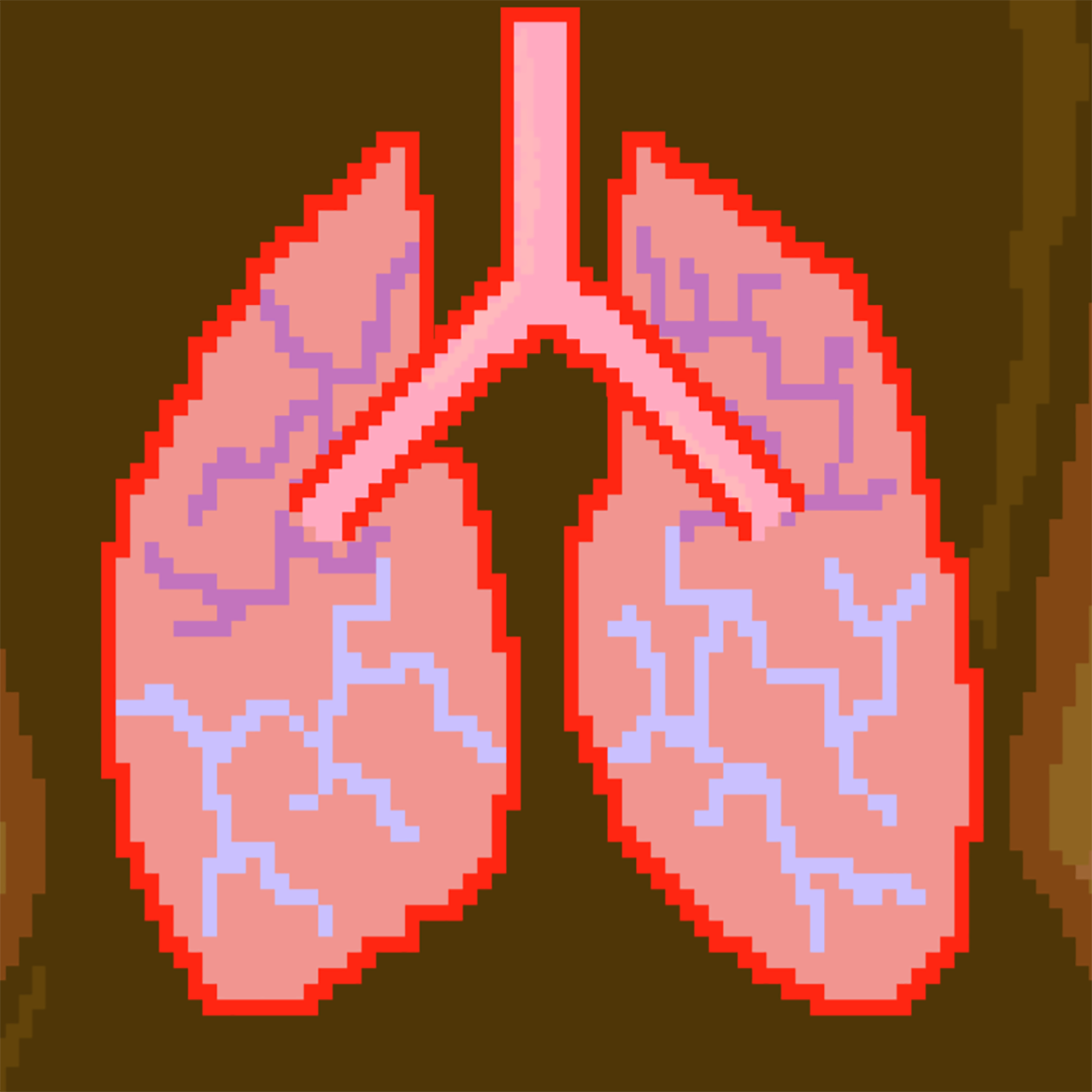
Creator: Kara Stone
GENRE: MEDIA ART, VIDEO GAME
TOPIC: ANXIETY, DEPRESSION, PSYCHIATRY
Medication Meditation is a single player game about the daily experience of living with mental illness. This game demonstrates the effort put into maintaining wellbeing and the mundane aspects of mental illness we often overlook. Anatomical, flesh coloured pixel art brings the player into a game-y feel and lets them focus on their somatic experience in this unwinnable game.
Kara Stone is an artist and scholar interested in the affective and gendered experiences of psychosocial disability, debility and healing as it relates to art production, particularly video games. Her artwork has been featured in The Atlantic, Wired and Vice. She is a member of the Different Games Collective. She is currently a PhD student in Film and Digital Media with a designated emphasis in Feminist Studies at University of California at Santa Cruz.
Images of the Medication Meditation installation in Re:Building Resilience:
Photos by Henry Chang
Please Note: There is one virtual ticket available for the entire Re:Building Resilience Exhibition. Whether you’d like to see one project or all of them, you only need to book one ticket to access everything. The exhibition runs October 15-25, and all purchasers will be sent a link to view the virtual content. Any ticket bought prior to October 15 will receive a follow up email on the 15th with the link.
Join Kara Stone on Mon, Oct 19 at 1 PM for an Instagram Live event to interact in real-time as they walk you through their artwork and answer your questions. Follow @workmanartsto to get notified when we go live.
ACCESSIBILITY
ASL Interpreted, Active Listener
An Active Listener will be available Mon, Oct 19 from 1-3pm to support this program.
Your active listener for this program is Amanda.
You can connect with Amanda by phone (talk or text) at (647) 696-0893 or by email at amanda.virtualdesk@gmail.com.
Self-Care Kits are available for free curbside pickup to ticket holders. Kits can be picked up from 651 Dufferin Street between the hours of 12PM-9PM, October 15-25. If pickup is not an accessible option for you, contact justina_zatzman@workmanarts.com for accommodation.
COMMUNITY PARTNER

ALSO OF INTEREST
Kenneth Paul Rosenberg / 2019 / USA / 84 min / Canadian Premiere
GENRE: DOCUMENTARY
TOPIC: PSYCHIATRY
TYPE: FILM
Haunted by the death of his sister Merle, psychiatrist Kenneth Paul Rosenberg takes on the role of documentary filmmaker to examine a national health crisis in the US. Bedlam follows personal stories of people living with schizophrenia, bipolar disorder and other chronic mental health issues with a television-style precision. Bedlam describes the deinstitutionalization triggers pulled in the mid- and late 20th century (which occurred in Canada as well) to create this ‘bedlam’ on an inter/national scale. Created over the course of five years, Bedlam takes us inside Los Angeles County’s overwhelmed and vastly under-resourced psychiatric ER; a nearby jail warehousing thousands of patients; and people suffering from severe mental health issues in their homes and homeless encampments, where silence and shame often worsen the suffering.
Screening with
Talking at Night
Eric Thiessen | 2017 | Canada | 6 mins
Director Eric Thiessen captures behind-the-scenes experiences of Saskatoon’s Mobile Crisis Centre staff as they provide 24/7 crisis resolution to people in distress.
#GETMAD: JOIN THE CONVERSATION
De-institutionalization On Both Sides Of The Border
How has de-institutionalization shaped Toronto? Have we fared any better in the practice of de-institutionalization than our US counterparts? The history of de-institutionalization in our city has led to the Mad Pride movement, shaped the neighbourhood of Parkdale (and others in the GTA) and continues to alter hospital emergency rooms, shelter systems and community-based harm reduction centres. In witnessing how the United States systems have been affected in the documentary Bedlam, we will use this film as a counterpoint to reflect on where we have been and where we are going here at home.
